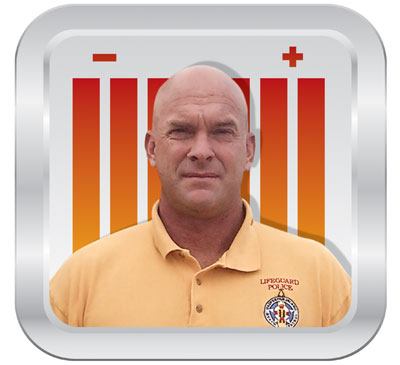Teacher, artist, volunteer, lifesaver … at one time or another, Peter Davis, chief of the Galveston Island Beach Patrol, has been all of these.
Today, as an international advocate for drowning prevention, he is using the skills and talents developed through a variety of unique experiences to raise awareness and improve water safety around the world.
A Galveston, Texas, native, Davis says his family has been part of the community for seven generations. He began lifeguarding in high school and joined the city beach patrol after a few years’ experience guarding at a local pool. Davis attended Trinity University in San Antonio, where he graduated in 1987 with a psychology degree. His intention was to become an art therapist. He received a graduate degree in fine arts from the University of California, Davis in 1997, but professionally he’s forged a career in aquatics.
He took a full-time position on the Galveston Island Beach Patrol in 1992. Since then, he has held a variety of positions in the organization, including lifeguard supervisor, training officer and media liaison.
“Part of the reason that I came into aquatics is that it combines a lot of what I love,” says Davis, 46. “Through aquatics, you can do a whole lot of good for people. That’s a big pull for me.”
As a leader on the beach patrol, Davis has focused a significant amount of energy on developing public education programs geared toward bringing water safety information to Galveston’s large Latino immigrant community, which has historically included a large percentage of nonswimmers.
Creative outreach efforts that Davis helped facilitate include school programs, camps, and Spanish-language television media coverage.
Right after college, he spent time teaching in Botswana, Africa. He says that experience showed him what it means to be part of a global community.
The lesson stayed with him, and in 2001 he facilitated an exchange program between the Galveston Island Beach Patrol and Vera Cruz, Mexico. A year later he helped establish a beach lifeguarding program in Venezuela. Since then, both programs have continued to grow, and today there are well-trained guards on the beaches in Mexico and Venezuela, helping to further spread the water safety message in their communities.
In addition to those efforts, Davis is secretary general – Americas Region for the International Lifesaving Federation, focusing on building similar sustainable programs throughout North and South America. He’s also involved with the United States Lifesaving Association, currently serving as vice president.
Davis recognized the need for effective communication early in his career and in working with the various Spanish-speaking communities, he became reasonably fluent. Looking ahead, he hopes to foster better communication between various international stakeholder groups, to help address global drowning rates. That means creating connections between various lifeguarding and water-safety groups and partnerships with agencies outside of aquatics, such as public health organizations.
“The lifeguard community has a skill set in a certain area, but it’s a very small piece of the global drowning epidemic puzzle,” Davis says. “We have to have an overall master plan.”



